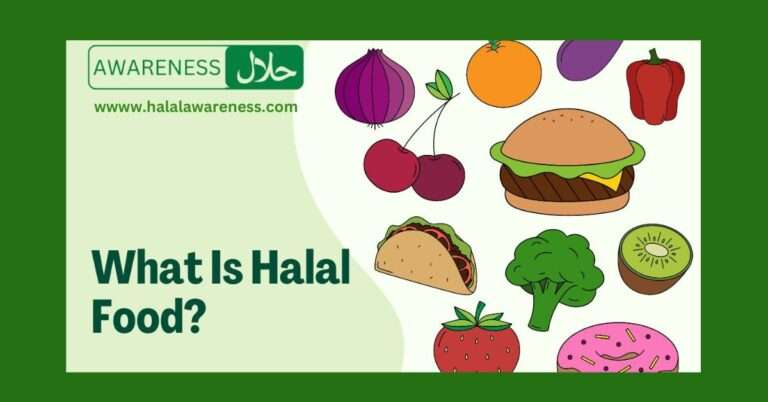✨ What Food Is Haram? A Complete Guide to Forbidden Foods in Islam
Islam places great emphasis on halal (permissible) and haram (forbidden) foods, guiding Muslims on what they can and cannot consume. Haram food refers to any food or drink that is explicitly prohibited by Islamic law (Shariah). This principle is derived from the Quran and Hadith, ensuring that Muslims follow dietary rules that align with their faith.
Knowing which foods are haram is essential for maintaining a pure and ethical diet. This guide explores what food is haram, why certain foods are forbidden, and how Muslims can ensure they follow halal dietary laws.
📝 What Makes Food Haram in Islam?
📖 Haram Foods in the Quran
The Quran provides clear guidelines on foods that are haram. Some key prohibitions include:
“He has only forbidden to you dead animals, blood, the flesh of swine, and that which has been dedicated to other than Allah.” (Quran 2:173)
These categories include:
- Pork and its by-products
- Dead meat (Carrion)
- Blood and blood by-products
- Animals sacrificed to other than Allah
- Intoxicants (Alcohol and drugs)
📜 Haram Foods in Hadiths
The Hadiths further elaborate on haram foods. Prophet Muhammad (peace be upon him) emphasized avoiding:
- Carnivorous animals (lions, wolves, dogs, etc.)
- Birds of prey (hawks, eagles, owls)
- Donkeys and mules
- Reptiles and insects
The Hadith also warns against doubtful foods and encourages Muslims to seek halal options whenever possible.
⚖️ Why Are Certain Foods Considered Haram?

The Quran and Hadith outline specific reasons why certain foods are considered haram. Here are the key factors:
✅ Explicit prohibition in the Quran or Hadith
✅ Causing harm to the body or mind
✅ Containing impure or unlawful ingredients
✅ Being obtained through unethical means
✅ Processed or contaminated with non-halal substances
By understanding these principles, Muslims can make informed food choices and comply with Islamic dietary laws.
🐖 Categories of Haram Food in Islam
🚫 1. Pork and Its By-Products
Pork is strictly forbidden in Islam. Common pork-derived products include:
❌ Bacon & Ham
❌ Gelatin (if sourced from pigs)
❌ Processed foods containing lard
❌ Marshmallows and gummy candies (unless halal-certified)
❌ Ice creams and yogurts with hidden pork enzymes
🐄 2. Carrion (Dead Meat)
Meat from animals that die naturally or are killed without Islamic slaughtering (Zabiha) is haram. Muslims are only permitted to consume meat that has been properly slaughtered in the name of Allah.
Examples of haram meat:
❌ Roadkill
❌ Animals that die from disease or injury
❌ Meat from animals killed by electric shock or drowning
❌ Meat stored or processed alongside non-halal meat
🩸 3. Blood and Blood By-Products
Consuming blood is forbidden in Islam as it is considered impure. This includes:
❌ Blood pudding
❌ Uncooked animal blood
❌ Sausages that contain blood
❌ Dishes made with coagulated blood (found in some cuisines)
🦁 4. Meat from Carnivorous Animals
Animals that feed on flesh are haram, including:
❌ Lions & Tigers
❌ Wolves & Dogs
❌ Cats
❌ Birds of prey (eagles, hawks, owls)
However, herbivorous animals like cows, goats, and chickens are halal if slaughtered correctly.

🍷 5. Alcohol and Intoxicants
Alcohol and intoxicants are strictly forbidden in Islam. The Quran states:
“O you who have believed, indeed, intoxicants, gambling, [sacrificing on] stone alters [to other than Allah], and divining arrows are but defilement from the work of Satan, so avoid it that you may be successful.” (Quran 5:90)
Haram substances include:
❌ Beer, wine, and liquor
❌ Foods prepared with alcohol
❌ Drugs and intoxicating substances
❌ Vanilla extract with alcohol (unless alcohol-free)
❌ Chocolates and desserts with alcohol-based fillings
🍕 6. Food Contaminated with Haram Ingredients
Even if a food is originally halal, it can become haram if mixed with forbidden substances. Examples:
❌ Foods cooked with pork fat
❌ Chocolates with alcohol-based flavoring
❌ Cheese made with rennet from non-halal animals
❌ Fast food fried in oil used for non-halal meat
❌ Sauces or dressings containing wine, beer, or other intoxicants
🔱 7. Foods Dedicated to Idols or Other Gods
Any food offered as a sacrifice to deities other than Allah is haram. This ensures that food consumption remains an act of devotion to Islam.
Examples:
❌ Foods used in religious rituals of other faiths
❌ Meat sacrificed in non-Islamic religious ceremonies

🔍 How to Identify Haram Food?
To ensure compliance with Islamic dietary laws, follow these guidelines:
✔ Check Food Labels: Look for halal certification symbols.
✔ Ask About Ingredients: When dining out, inquire about meat sources and additives.
✔ Avoid Ambiguous Foods: If unsure about a food’s status, it is best to avoid it.
✔ Research Restaurant Policies: Many food establishments provide halal options.
✔ Use Halal Food Apps: Apps like Scan Halal and Halal Navi help identify halal foods.
✅ Halal Certification and Reliable Sources
Several organizations certify halal food products. Well-known halal certification bodies include:
🌍 JAKIM (Malaysia)
🌍 Halal Certification Authority (HCA, Australia)
🌍 Islamic Food and Nutrition Council of America (IFANCA, USA)
🌍 The Halal Monitoring Committee (HMC, UK)
🌍 Halal Food Authority (HFA, UK)
Always look for a trusted halal logo when purchasing processed or packaged food.
🏁 Conclusion
Islamic dietary laws emphasize purity, health, and ethical consumption. The Quran and Hadith provide clear guidelines on what food is haram, helping Muslims make informed food choices. By avoiding prohibited foods and checking for halal certification, one can ensure compliance with Islamic teachings while maintaining a healthy and ethical diet.
❓ FAQs About Haram Food
What happens if I accidentally eat haram food?
If consumed unintentionally, there is no sin in Islam. However, one should avoid it in the future and seek forgiveness.
Are seafood and fish halal?
Most seafood is halal, except for toxic or harmful sea creatures. Some scholars debate shellfish permissibility.
Can medicine contain haram ingredients?
If no halal alternative is available, Islam allows consuming haram substances for medical necessity.
Is it okay to eat in a non-halal restaurant?
Yes, as long as you consume halal-certified or vegetarian options and avoid cross-contamination.







